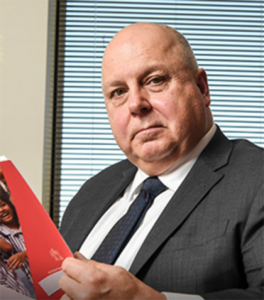Analysis – Victorian budget prioritises groups worst hit by the pandemic
In its 2021-22 budget the Victorian Government has made large investments in areas that will directly benefit the state’s multicultural communities and families as well as vulnerable groups in society.
There is significant new support for skills and training, mental health and family violence; as well as specific funding earmarked to help culturally and linguistically diverse people access the opportunities this funding represents.
 The budget contains $3.8 billion to rebuild the state’s mental health system that a royal commission found had “catastrophically failed” funded by a 0.5 per cent surcharge on big businesses.
The budget contains $3.8 billion to rebuild the state’s mental health system that a royal commission found had “catastrophically failed” funded by a 0.5 per cent surcharge on big businesses.
It also contains $383.3 million for better access to training and, including $85.9 million for the Victorian Skills Authority, which will be tasked with supporting migrants and refugees to have their skills and qualifications recognised.
This includes $88.8 million for Vocational Education and Training student places, including for asylum seekers.
The budget has also earmarked almost $24 million for multicultural communities, including support for seniors, refugees and community events. It also contains $9.6 million to help diverse communities navigate the mental health system.
There is also $8 million in the Multicultural Seniors Support grants to support hundreds of groups across the state.
AMES Australia CEO Cath Scarth said the funding in skills, mental health and the prevention of family violence would benefit vulnerable groups in society, including migrants, refugees and members of culturally and linguistically diverse (CALD) communities.
“We welcome the new funding for skills and mental health and also the focus on family violence. This will help to close the gaps we see in vulnerable groups – and particularly migrants, refugees and CALD communities – accessing training and employment as well as health and family violence services.
“But we need to ensure all of the opportunities created by this spending across all of the budget initiatives are available to everyone. Too often vulnerable groups, including people from diverse backgrounds, find it more difficult to access training opportunities and the jobs that stem from them,” Ms Scarth said.
“And we know that migrants and especially refugees – who may have endured trauma or torture – are vulnerable to mental health issues, so the extra funding is very welcome,” she said.
The budget contains support for critical services for some of Victoria’s most vulnerable multicultural communities with $8.8 million going towards essential programs that streamline settlement for humanitarian arrivals and support migrant communities.
But it assumes overseas migration and international student numbers will remain below pre-pandemic levels until the middle of 2025.
The budget papers predict overseas students, previously worth almost $14 billion a year to the Victorian economy, would begin “slowly” returning to Victoria from the start of 2022.
And they warn that further delays to the reopening of borders and the global vaccine rollout presented a “key downside risk” for the budget.
The budget includes support for the Family Violence Graduate Program, which will help up to 80 new graduates with training and on‑the‑job support as they work towards becoming specialists in family violence services.
There is $3.2 million to support gender equality programs that support women’s financial security, particularly women from migrant and refugee backgrounds.
And $2.4 million will continue the vital work of Victoria’s women’s health services in preventing family violence, and providing services in sexual, reproductive and mental health with $4.1 million going to support sexual and reproductive health hubs.
Funding of $49 million will go towards supporting all survivors of family violence and sexual assault, including women on temporary visas, providing culturally safe responses for Aboriginal victim survivors, and building the capacity of the state’s services to respond to diverse and faith communities.
The 2021-22 Victorian State Budget also contains $3.5 billion for education and school infrastructure.
The budget has set aside $1.6 billion to build new schools and improve existing schools – above the $3 billion promised in last year’s budget.
The government says this will create 3,500 new jobs in construction and associated industries, including 2,900 jobs in metropolitan Melbourne and 600 jobs in regional Victoria.
This amounts to $492 million to build 13 new schools, with 12 schools opening in 2023 and one in 2024.
The state government has pledged 52 schools will have better classrooms, libraries and learning spaces with a $340 million boost, upgrading 35 metropolitan schools and 17 regional schools.
An additional $188 million will go towards maintenance and upgrading schools.
The $3.8 billion pledged over four years to overhaul the state’s mental health system includes $1.5 billion for community-based care and $264 million to build the first 20 of up to 60 local mental health services.
There is also a $3.6 billion package to focus on improving emergency care and ambulance services by hiring more staff.
The burgeoning elective surgery list is also a target of the spending along with $1.2 billion worth of hospital upgrades.
There is $288 million over four years in the budget to support culture and arts industries, some of the worst hit by COVID-19 lockdown.
There’s also $100 million for city spaces, arts events and outdoor dining, plus $7 million for dining vouchers.
Victoria will see record a $17.4 billion deficit this financial year – $6 billion less than forecast last year.
The state’s net debt is still on track to soar to $102 billion next financial year, rising to $156.3 billion by 2025.
Treasury forecasts Victoria’s economy will grow by 6.5 per cent in 2021-22, higher than the projected 4.25 per cent.












